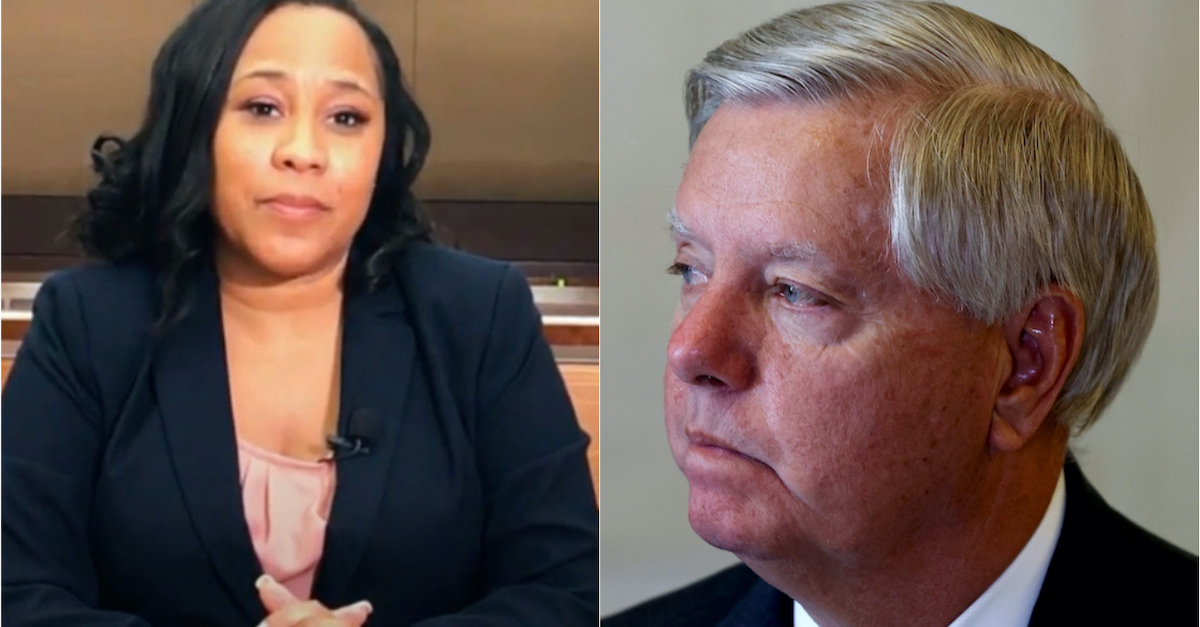
Fani Willis and Lindsey Graham
The Fulton County District Attorney’s office responded to arguments South Carolina Sen. Lindsey Graham (R) made about why he should not have to testify about his knowledge of or potential involvement in efforts to interfere with the 2020 election. In court documents filed Monday, Fulton County District Attorney Fani Willis (D) urged the court to reject Graham’s arguments, and not to stand in as a “rubber stamp for his own conclusions.”
Georgia investigators have said they want to question Graham about phone calls he had with Georgia election officials, including at least two calls with Georgia Secretary of State Brad Raffensperger (R) in late 2020. During the same time, former President Donald Trump told Raffensperger to “find 11,780 votes.”
The district court rejected Graham’s arguments and refused to quash the subpoena. On Aug. 21, a three-judge panel of the U.S. Court of Appeals for the 11th Circuit temporarily put Willis’ subpoena on hold to give Graham more time to present a fully developed argument as to whether the Constitution’s Speech or Debate Clause shields Graham from testifying.
Graham argued again that any phone calls he made were legislative in nature, and as such, the Speech or Debate Clause provides ample grounds for quashing a subpoena requiring testimony on the calls.
Willis responded that “even if informal investigations by individual members of Congress are protected under the Speech or Debate Clause, the record does not establish that the phone calls were a part of any such investigation by Senator Graham,” and that the Raffensperger conversation could not possibly have been “legislative in nature” given that “the Senator’s own statements fail to establish a legislative purpose to the conversation.”
Willis further argued in the memo to the court that Graham’s argument “entirely ignore[s] the context” in which the calls in question were made.
Part of the context raised by Willis was that on the same day Graham called Raffensperger, attorney Lin Wood filed a filed a federal lawsuit against Raffensperger and the Georgia State Election Board over a settlement agreement regarding procedures for notifying voters about problems with signatures on absentee ballots. This background context, argued Willis, “does not support the Senator’s characterization of the conversation as a product of his own curiosity.”
Further, argued Willis, Graham’s statements, tweets, and actions all suggest something other than the kind of legislative actions to which the Speech or Debate Clause might be applicable. From the memo:
The Senator’s repeated insistence that the calls were part of a legitimate legislative investigation and absolutely nothing else ignores this context, as well as the inherently inappropriate (and neither legitimate, ordinary, nor traditionally legislative) nature of the phone calls themselves.
Willis pointed to a Nov. 18, 2020 letter from Walter Shaub (the filing misspelled his name “Schaub”), the former Director of the U.S. Office of Government Ethics, on the matter:
On its face, [Senator Graham’s] explanation suggests misconduct. Any call by a sitting chairman of the Senate Judiciary Committee to a state election official during an ongoing count of votes is inherently coercive and points to an attempt to influence the outcome of the ballot counting.
Shaub’s letter continued:
Even if your committee were to reject Secretary Raffensperger’s allegation regarding the content of the communication, the conduct Senator Graham has admitted is deeply troubling. There can be no legitimate reason for the Judiciary Committee’s chairman to call a top election official regarding an ongoing vote count.
Willis continued and said that any conclusion that Graham’s calls were “comprised entirely of sanctioned legislative factfinding” would require ignoring a litany of background facts ranging from Graham’s own actions to Raffensperger’s repeated statements about his own recollection of the call.
Graham’s actions and his public support of Trump must be taken into account to appropriately assess the senator’s argument against the subpoena, Willis argued:
At the most basic level, the transparently coercive and inappropriate nature of the Senator’s contact with another state’s elections official in the midst of a recount, particularly given the Senator’s outspoken and vehement public advocacy for his political ally, who was of course one of the interested parties in the recount and who was personally and publicly attacking Secretary Raffensperger at the time.
Willis continued and said that Graham is trying to convince the court that “cajoling state-level executive branch officials to implement their laws in accordance with the Senator’s preferences is actually protected legislative activity, and that if it is not, it should be.”
Finally, Willis urged the court to recognize that Graham’s argument for a “partial quashing” is really no different from his argument for a complete quashing of the subpoena. Willis said that based on Graham’s argument, “literally all topics” would be “off limits.” Willis paraphrased Graham’s argument as follows:
He stands above the power to be questioned. Because he cast a vote as required of him under the Electoral Count Act, he can take any action he likes with regard to the executive branch, and he cannot ever be ordered to answer questions about those actions by the judicial branch, so long as he merely asserts that, actually, it all stemmed from his legislative duties.
That position, said Willis, is just what U.S. Supreme Court Justice John Paul Stevens (the filing misspelled the late justice’s last name as “Stephens”) warned against in United States v. Helstoski, a 1979 case in which Stevens said that protecting a senator’s illegal actions by using the Speech or Debate Clause to stifle an investigation would cause elected officials to become “super-citizens.”
“The Senator has finally jumped into those waters with both feet,” said Willis’ response.
Read the DA’s full response here.
(Screengrab of Willis via Fulton County; Photo of Graham via Anna Moneymaker/Getty Images)
Have a tip we should know? [email protected]